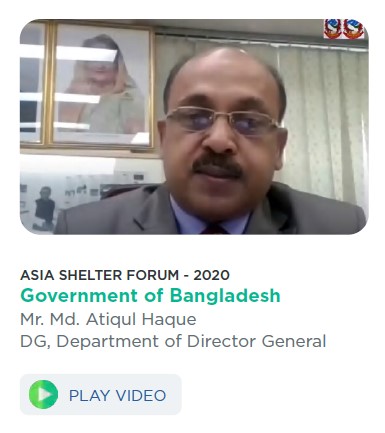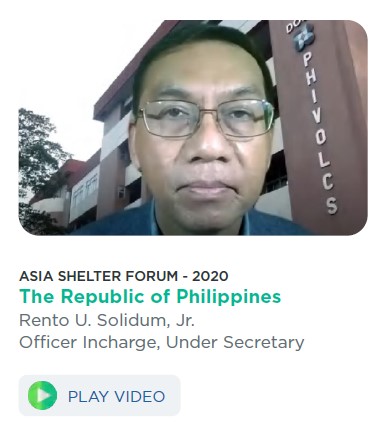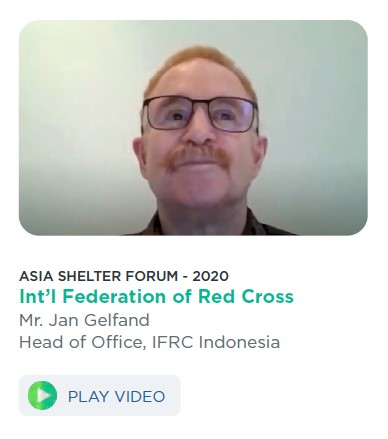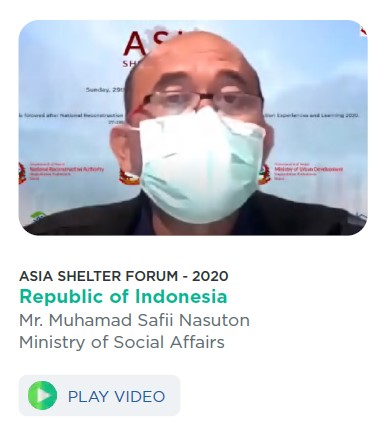MESSAGE FROM THE GOVERNMENT OF BANGLADESH
Department of Director General
Mr. Md. Atiqul Haque applauded the forum’s capacity to share experiences and learning on the expansion of urban housing and settlement, and also stressed the need for multilateral dialogue on urban housing and shelter. He gave an overview of Bangladesh’s vulnerability to the natural disaster including floods, cyclones, riverbank erosion, typhoons. These are the major cause of distress, displacement, and vulnerability of a large number of people in both urban and rural dwellings. Forums and platforms like ASF need to be strengthened from country to country, cluster to cluster and from community to community. Accountable assistance for disaster affected populations is possible through effective partnership and more collaboration, accountable assistance can be provided to people suffering from disaster. Immediate recovery relies on humanitarian assistance. Role of humanitarian organization becomes paramount in crisis situations. In partnership with the government, humanitarian actors can reach the most vulnerable population like people with disabilities, pregnant and lactating mothers, female-headed households, senior citizens, marginalized castes, and, disaster and conflict affected populations. Issues of vulnerable people and underprivileged communities, disaster-affected people, and conflict-affected people need to be addressed accordingly and discussed in different forums. Humanitarian actors need to contribute in formulating humanitarian assistance policy. ASF is a milestone to enhance knowledge of shelter practitioners through sharing of capacity building initiatives on disaster preparedness and response. He is assured ASF will continue to build stronger shelter communities of shelter practitioners of Asia Region to contribute to the global shelter forum. He expressed People’s Republic of Bangladesh’s interest in organizing the future Asia Shelter Forum.
MESSAGE FROM THE REPUBLIC OF PHILIPPINES
Officer Incharge, Under Secretary
Mr. Renato U. Solidum, Jr. stated that Asia is prone to natural hazards and global warming. Every year disastrous events are reported in many zones of the Asia-Pacific region. Many people lose their lives, get injured, and are displaced. Physical and social infrastructure of the nation gets disrupted and also severely affects public service. He suggested three action points to make a resilient community, and also to reduce the heavy losses from the disaster; reduce the potential risk of hazards or global warming, needs to have an effective and efficient response, which requires preparedness, and doing many simulation exercises, and appropriate and prompt response to the disaster. There can be lingering horizontal impact and risk, though the possible damages and loss from hazards are minimized from better preparedness and response. Hence, they need prompt response and immediate recovery from the disaster. Lessons from the past disaster should be mainstreamed into the recovery program. Every individual needs to know how to survive before, during, and aftermath of disaster. There should be easy and prompt access to basic access services such as health, schools and most importantly shelter aftermath of disaster. Inter community support should be guided by national policies. Contribution of every sector helps in achieving resilient communities. In particular for shelter, he further suggested to consider the followings three points:
- make sure settlement is in the safe location
- follow the safe construction standard, and use quality construction
materials - community must be aware of what to do before, during, and aftermath
of the disaster
MESSAGE FROM INTERNATIONAL FEDERATION OF RED CROSS
Head of Office, IFRC Indonesia
Mr. Jan Gelfand stated Shelter as the process beyond the product. It is more than a technical endeavor. Shelter intervention needs standard,
law, policy, finance and skilled human resources. Recent COVID-19
pandemic further sensitized the importance of shelter to deal with
stresses and shocks due to multitude disasters. Shelter and settlement
give a sense of belonging, safety and security, in our sense of belonging.
This is important to build and nurture relationships with the fundamental
building blocks of community. He highlighted the role of government
and political will for sustainability of shelter intervention because shelter
requires law, policy, guidelines, budget and skilled human resources. Sustainable shelter intervention should be guided with an anticipatory method to reduce vulnerability, use of cash grants and most significantly community engagement for accountability.
He thanked all the organizations for engaging in creative dialogue in shelter. He encouraged participants to push limits and think globally. Learning from each other is vital to promote innovation and creative thinking. Coordination events like ASF need to take place in the field to measure success and get realistic feedback. He acknowledged that shelter is fundamental to any agenda of localization, and also expressed IFRC commitment to continuously support and coordinate in shelter before, during, and aftermath of disaster.
MESSAGE FROM REPUBLIC OF INDONESIA
Ministry of Social Affairs
Mr. Muhamad Safii Nasuton, delivered a message to the Government of Nepal for recognizing role of the local government as a first responder to disaster. The local government has diverse experience in shelter response. Therefore, it is critical to facilitate collaboration between local governments with other shelter actors across the Asia region to strengthen shelter capacity. Threats imposed due to COVID-19 pandemic have restricted the mobility of human beings. This has amplified the need of shelter and also provided more opportunities to explore and examine to create breakthroughs on shelter response. In times of disasters, there is substantial demand for shelter. So, it requires collaboration among humanitarian organizations. Coordination is key to ensure that affected families receive humanitarian assistance. He highlighted that Ministry of Social Affairs is standby as the coordinator of shelter sub-cluster to orchestrate a smooth transition for better life of the affected
population. He mentioned that shelter sub-cluster have supported humanitarian actors in assisting over one million disaster affected populations in Indonesia.
Shelter sub-cluster is currently supporting coordination for COVID-19 situation to commence interagency collaboration that is strengthening the capacity of cluster members over 30,000 volunteers of the Ministry of Social Affairs across Indonesia. They have also facilitated the development of policy, guidelines and tools at national and local level for shelter assistance. This policy and guidelines include humanitarian shelter guideline, guideline on construction during COVID-19 situation, standard for temporary shelter etc. He handed over ASF certificate to the joint panel of National Reconstruction Authority and Government of Nepal – Ministry of Urban Development on behalf of Republic of Indonesia.




